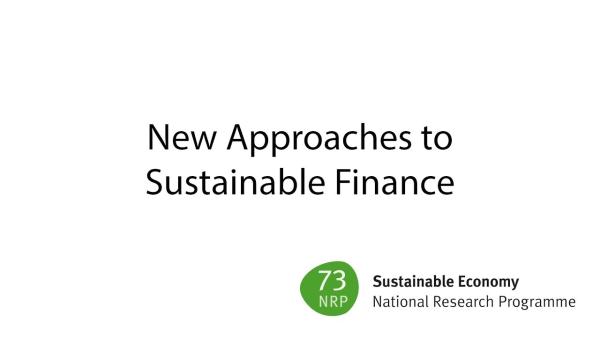Sustainable finance
In this project, we examined how green bonds can influence corporate choices of “green” investment projects. Furthermore, we quantified the environmental and social footprints of institutional investors’ portfolio holdings and examined whether they invest responsibly when they claim they do. The focus lay on ways to improve access to financial capital for microfinance investment vehicles and institutions and on the possible implementation of a Swiss social stock exchange.

Background
Knowledge about sustainable finance has steadily increased over the past few decades. Yet the mainstream economic literature still perceives firms as entities that solely seek to maximise profits and are insensitive to ESG (environmental, social and governance) considerations. Because of this, research has largely neglected the impact of institutional investors, such as banks and pension funds, on ESG. In terms of financing, a Swiss social stock exchange still needs to be implemented in order to further provide funding for microfinance further initiatives.
Aims
The aim of this project was to build on the current state of research and make both scientific and practical contributions. We aimed to accomplish this by increasing the quantity and quality of available knowledge, devising sustainable policies rooted in scientific evidence, and implementing an operational Swiss sustainable stock exchange that will support ESG initiatives by offering financing opportunities to microfinance investment vehicles and microfinance institutions.
Results
Sustainable finance certification
The first subproject showed that green finance certification allows managers to signal firms' efficiency at addressing the energy transition. In our model of green bond issuance, signalling amplifies incentives to decarbonise. The model predicts that firms' managers are more inclined to issue green bonds when they are more interested in stock prices. We tested this prediction by exploiting cross-industry differences in the stock-price sensitivity of managers' compensation and cross-country variations in actual carbon prices.
Sustainability footprint of institutional investors
The second subproject, which focused on the sustainability footprint of institutional investors, provided the following key results:
-
Institutional investors play a prominent role in promoting sustainability in the economy.
-
Some institutional investors claim to promote sustainability, but do not do so in practice.
-
On the methodological side, we see that there is substantial heterogeneity in ESG data vendors’ ratings.
-
High ESG rating disagreement is perceived as an additional source of uncertainty by financial investors.
Sustainable microfinance
The third subproject, which focused on sustainable microfinance, provided the following key results:
-
Off-grid solar energy (OGS) is instrumental to achieving access to affordable, reliable, sustainable and modern energy for low-income unbanked household enterprises in the South (Sustainable Development Goal 7 (SDG7)).
-
Access to finance is vital to ensure provision with off-grid solar energy.
-
In the last decade, substantial progress had been made towards SDG7, half of it thanks to OGS start-ups reaching around 500 million households.
-
Pay-as-you-go financing schemes are highly successful and receive 85% of all solar investments; however, scaling up remains difficult, in particular with the challenges posed by Covid-19.
-
The global crisis brought about by Covid-19 reduces OGS customers’ ability to pay, disrupts OGS value chains and freezes capital flows into the sector.
A sustainable social stock exchange in Switzerland
The last subproject, which focused on creating a social stock exchange in Switzerland, provided the following key results:
-
A large market for both social businesses and impact investors exists at the global level.
-
Existing initiatives to create social stock markets have shown that implementation is challenging.
-
A successful Swiss social stock exchange needs to establish strategic partnerships and concentrate on impact verification, pipeline building and impact measurement.
-
Developing a stand-alone and fully fledged infrastructure from scratch is not recommended.
Implications for research
The following key implications have been determined for research:
-
The effect of managers' incentives on green bond issuance increases with carbon penalties. Our results suggest that green bonds are complements to, rather than substitutes for, carbon taxes.
-
It is important to detect and measure the externalities related to greenwashing among institutional investors who use sustainable finance motives as a commercial device to attract flows from uninformed clients.
-
The collective intelligence of stakeholders in the off-grid solar energy sector is likely instrumental in enabling the sector to weather the long-term impact of the Covid-19 pandemic.
Implications for practice
The following key implications have been determined for practice:
-
Green finance instruments should be complemented with managers’ green compensation packages, giving them direct incentives to decarbonise their activities.
-
Asset managers cannot simply rely on sustainability labels when assessing the sustainability credentials of investment managers.
-
The solar off-grid sector is likely to engender more concentration and specialisation. Covid-19 may reduce the number of investors and their appetite for taking risks, increasing the scope for blended finance.
-
The creation of a successful Swiss social stock exchange will require taking away an entrepreneurial dimension from a traditional NGO-led one.
Publications
Project leaders
Prof. Dr. Jean-Charles Rochet
University of Geneva and Swiss Finance Institute, Geneva
Prof. Dr. Rajna Gibson Brandon
University of Geneva and Swiss Finance Institute, Geneva
Prof. Dr. Bernhard Balkenhol
University of Geneva, Geneva
Project partners
iGravity
IMPAAKT
Principles for Responsible Investment
Sustainable Finance Geneva

